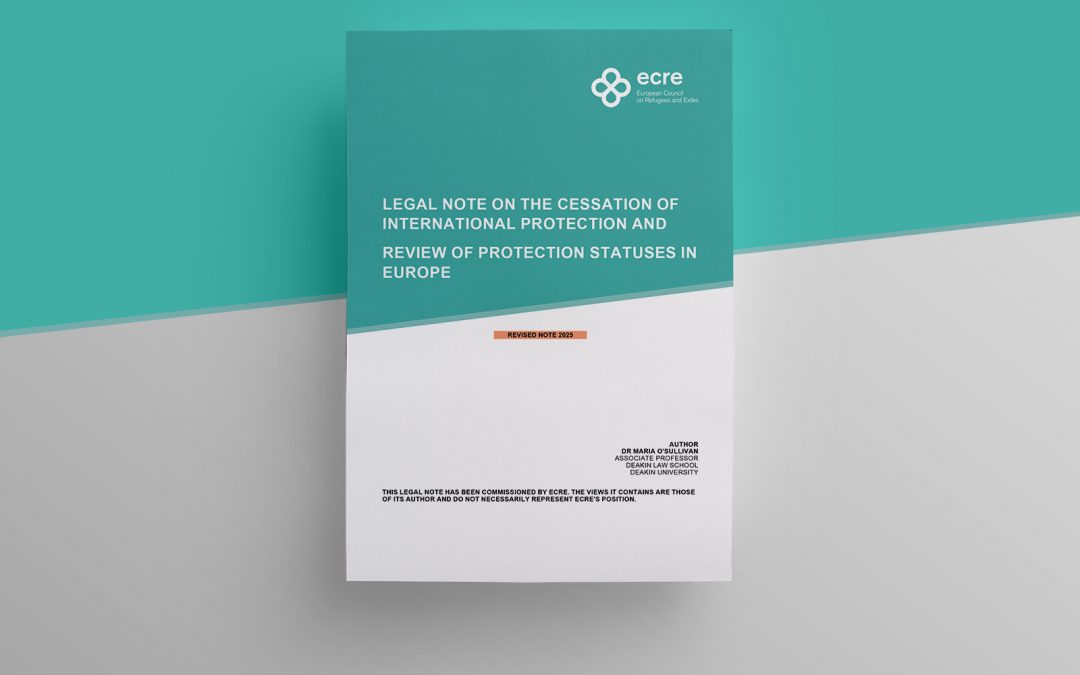ECRE has published a legal note on cessation of international protection and review of international protection statuses in Europe. It is a new version of a similar legal note that was published in 2021, updated to include recent case law and analysis in relation to the transition in Syria. It should be read with the policy note on maintaining international protection in Europe during Syria’s transition that was published in March 2025.
The legal note examines the provisions in the EU’s legal framework on cessation. The 2011 Recast Qualification Directive allows EU member states to issue three-year residence permits to refugees and one-year residence permits to holders of subsidiary protection. The Directive also then allows states to review cases upon expiry of those permits and to revoke a person’s international protection status and residence if circumstances in the country of origin have changed. The legal note considers the changes brought about by the recently-adopted 2024 Qualification Regulation which repeals the 2011 Qualification Directive with effect from June 2026.
Given that the cessation provisions in the two instruments are very similar, case law relating to the 2011 Qualification Directive is likely to continue to be relevant to the 2024 Qualification Regulation. One notable exception is the amendment made to the internal protection alternative (IPA) provisions in Article 8 of the 2024 Qualification Regulation which now obliges member states to apply an IPA in relation to applications for international protection, although only when states and the agents of states are not the actor of persecution.
The legal note also examines state practice of cessation in Europe, where a number of countries have used cessation to revoke the international protection status, including Germany, Norway and Denmark. It is noteworthy that many of those who have had their international protection revoked using cessation are citizens of Iraq, Afghanistan, Somalia and Syria – countries which are either currently in an armed conflict or post-conflict situation. This raises legal issues as to the correct test to be used for cessation where the security situation in a country may continue to be uncertain or precarious. In terms of state practice, the primary provision utilised by states to cease international protection is Article 1C(5) of the Refugee Convention (reflected in Articles 11 and 16 of the Qualification Directive). This relates to changes in the circumstances in the refugee’s country of origin.
The legal note sets out the legal obligations relating to cessation under international and EU law, covering statutory provisions and the judgments of the Court of Justice of the EU, with a focus on the cessation provisions themselves. It also considers recent ancillary case law which may have implications for current caseloads.
The legal note then examines eight main legal issues that have been raised by the national state practice of cessation in Europe:
- Is the test for cessation of refugee status similar to that for recognition of refugee status? Is it the ‘mirror’ of recognition?
- What is the standard of proof to be used for cessation?
- What procedural obligations are placed on a national status determination body and/or applicant to demonstrate eligibility for international protection where one of the statuses of international protection has been revoked?
- When will return to the country of origin or other acts of re-availment of the protection of the country of origin engage the cessation clauses?
- Can non-state actors of protection provide ‘protection’ for the purpose of cessation?
- Does the existence of an international protection alternative (IPA) constitute a relevant change in circumstance which can give rise to cessation?
- How should the ‘compelling circumstances’ exception to cessation be applied?
- Does cessation require assessment of humanitarian considerations and, as part of this, what is the relationship between cessation and the European Convention on Human Rights?
The legal note is available here.

